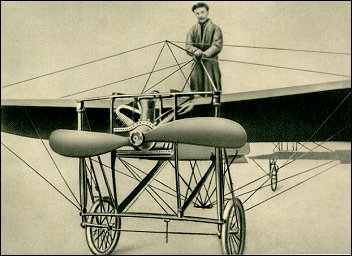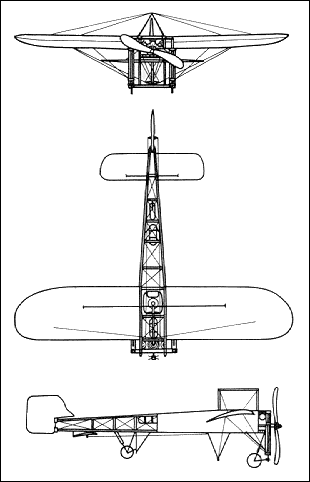|
| The first flight of a Type XI was made on 23 January 1909 on the power of a 21.5kW REP engine driving an inefficient four-blade propeller. During April and May the aircraft was refined and fitted with a 16.4-18.6kW Anzani 3 engine and Chauviere two-blade propeller. The central fin that had been fitted was removed and the rudder was enlarged and deepened, and the 'elevons' at the ends of the tailplane were arranged to function solely as elevators.
The most famous exploit of a Type XI was the cross-Channel flight on 25 July 1909. The actual aircraft used is preserved in the Paris Conservatoire des Arts et Metiers. However many Type XI were built for civil and military use: one became the first aeroplane to be used in a war, when Capitano Piazza of Italy made a reconnaissance sortie over Turkish troops at Azizia on 22 October 1911. Similarly the first bombs to be dropped from an aeroplane were released from a Type XI on 1 November 1911.
| CREW | 1 |
| PASSENGERS | 1 |
| ENGINE | 1 x Anzani, 18kW |
| WEIGHTS |
| Take-off weight | 270 kg | 595 lb |
| Empty weight | 210 kg | 463 lb |
| DIMENSIONS |
| Wingspan | 8.2 m | 27 ft 11 in |
| Length | 7.7 m | 25 ft 3 in |
| Height | 2.5 m | 8 ft 2 in |
| Wing area | 14.0 m2 | 150.69 sq ft |
| PERFORMANCE |
| Max. speed | 70 km/h | 43 mph |
| ubaTaeCJ, e-mail, 21.02.2025 19:53 20 reply | | Bob Kusterer, e-mail, 07.02.2014 19:49 Hey COWNBY, I've seen it fly at Old Rheinbeck too. Great show they have there. I was friends with Cole Palen. I arranged for a few donations (mostly parts). reply |
| Geoffrey Pruett, e-mail, 01.10.2013 17:52 This is a hands on designers answer to weight managment, the engine, wing mounts, and landing gear all join in one area keeping the heavy framing to a minimum. This fit the power plants available. reply | | Barrett, e-mail, 13.11.2011 20:56 While it prides me to know that Americans achieved the first sustained controlled flight of a heavier than air airplane, the French have at least as much to be proud of. While we were tinkering with tail-first fragile biplanes, French designers like Bleriot and Levavasseur were writing the book on aircraft design and arrangement that is still relevant today. reply | |
| | leo rudnicki, e-mail, 29.04.2009 00:51 You're lucky. On my my trip there, the Anzani refused to burp. Attempts by some owners to install big rotaries led to death by wing flutter, which caused the British powers that be to scorn any attempts to seek approval for monoplanes resulting in the Gloster Gladiator being a frontline fighter in 1940. I was going to build a static model using coathangers but couldn't figure out the undercarriage. Too hi-tech for me. reply | | Cownby, e-mail, 29.12.2008 16:20 I've seen this plane in the air at Old Reinbeck areodrome. All be it only 3 meters off the ground but impressive never the less. Can't imagine fling it across the channel. reply | | sergio, e-mail, 17.01.2007 02:00 amm miren louis bleriot abia cruzado el canal de la mancha.. ahh y para que cachen y ademas fue en julio de 1909 y fue en caen una ciudad de francia reply |
|
Do you have any comments?
|
| 
All the World's Rotorcraft |







20
reply